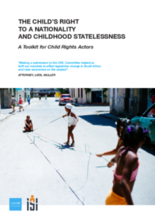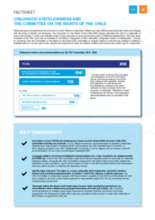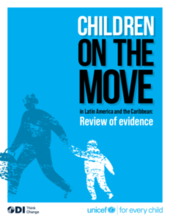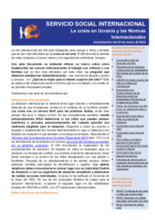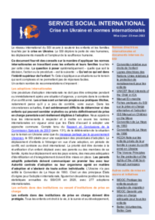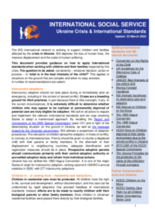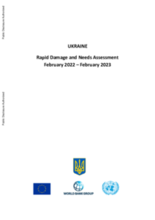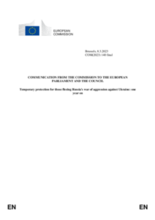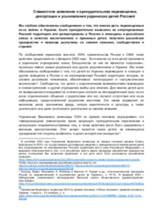Displaying 81 - 90 of 530
This study comprises ‘multiple elements including practical tips on how to meaningfully engage with the Committee on the Rights of the Child on childhood statelessness, complemented by a checklist, template and guidance note on how to make submissions’.
This document includes useful graphic information, ‘analysing CRC Committee recommendations on the child’s right to nationality and the protection of stateless children, capturing a snapshot of progressive engagement by the Committee on these issues between 2010-2020’. The factsheet is a brief and very useful document for all actors wishing to engage with the CRC Committee.
During this webinar, participants explored the dynamics of migrant child labor in the United States. Will efforts to “crack down” on child labor stop exploitation? How will forthcoming changes to U.S. asylum processes impact migrant children and their livelihoods? Most importantly, what do migrant youth have to say about their experiences?
This report aims to synthesize recent evidence concerning the experiences and needs of children affected by human mobility in Latin America and the Caribbean, and on how far programmes and policies are meeting those needs. It is motivated by a desire on the part of the United Nations Children’s Fund Latin America and Caribbean Regional Office (UNICEF LACRO) to promote proven responses to human mobility that genuinely respond to the needs of children and families: in their communities of origin, in transit, as they settle in new countries, or if they return to their countries of origin.
Con este documento se pretende ofrecer un marco sobre cómo implementar las normas internacionales al trabajar con niños/as y sus
familias que se han visto afectados por esta crisis.
Ce document fournit des conseils sur la manière d’appliquer les normes internationales en travaillant avec les enfants et leurs familles touchés par cette crise.
This International Social Service document provides guidance on how to apply international standards when working with children and their families impacted by the crisis in Ukraine.
The report focuses on the 5 key strategic priorities: critical and social infrastructure, energy infrastructure, housing, private sectors development and humanitarian demining.
This Communication takes stock of the Temporary Protection Directive implemented on 4 March 2022 over the course of one year. It provides insight into how the EU managed to enable and coordinate a response to the largest displacement on European soil since the Second World War.
Принудительное перемещение, депортация и усыновление детей из Украины, призводящее к окончательному разлучению детей с их семьями, сообществами и культурой, является явным нарушением их прав человека и международного гуманитарного права и пр

